
It used to be Apple’s big announcements were what captivated the tech industry – and the rest of the world. And not to take anything away from iPhone 11, but Apple’s been making a pretty cool phone with most of these features for some time now. There hasn’t been a lot of whiz-bang, oh wow! news coming out of Cupertino lately.
The action is happening over at Amazon, where new Alexa-ish products keep on rolling out. Surprisingly, media coverage of Amazon’s media event in Seattle received paled in comparison to what Apple gets out of their new product extravaganzas.
But when it comes to Alexa devices, Amazon may have outdone itself last week.
Of course, everything revolves around Amazon’s voice products as it continues its drag race with Google in this space. Oddly enough, Google does well outside the U.S. But here in America, it’s an Amazon dominated landscape. (And where’s Apple when it comes to voice?)
That’s why it’s important for everyone in radio to keep pace with how “voice” is growing and changing – in much the way the industry was hyper-focused on social media and mobile just a decade ago.
That’s because “voice” is moving fast as a discovery/usage engine, and yet, many radio brands and companies are not thinking about it all that much. But they should be.
We’ve talked about Amazon’s Echo Auto product – the cheap (under $25) aftermarket add-on that brings Alexa into vehicles. It’s being distributed by “invitation only” (whatever that means).
I haven’t gotten my hands on one of these yet (although I ordered mine back in the winter), but I know a number of you have. And you’ve been kind enough to give me your reviews of this new device.
KUPD’s visionary head of programming, Larry McFeelie, shot me a note last week after his Echo Auto showed up. Here’s his take:

“Quite frankly, it was a clunky experience and I’m not sure I understand the necessity for having Alexa available in the car. The unit comes with a mount that magnetically holds the Echo Auto and connects to your air conditioner vent. Then you have a power cable that sticks out of the side and they even include a cigarette lighter power charger with extra USB ports in case you have other items to charge. Even still, this felt like I was plugging things into things into things with cables hanging off of stuff. It just felt too “after market” for my taste.
“The Echo Auto uses your phone (and Alexa app) for internet access and if your phone connects via Bluetooth, the Echo Auto can transmit its messages directly through your phone’s audio. So it’s not like it’s taking up your connection in the car, it just needs to be there to transmit messages through your phone. If you don’t have Bluetooth, they included a 3.5mm auxiliary cable you can connect directly into the unit.
“Other than requesting ‘Flash Briefings’ and ordering more garbage on Amazon, I wasn’t able to find too many things that the Echo Auto could do…that my iPhone couldn’t. It’s nice to tell Alexa to “play 98KUPD”, but I can just as easily hit the 98KUPD app on my phone. The unit came with a free audio book from Audible, but again, why couldn’t I just use the Audible app on my phone?
“Anyway, that’s my short, quick review on the new Amazon Echo Auto. I don’t think it will be taking the world by storm. Just my two cents.”
At times, it seems like Amazon may be throwing techie spaghetti at the wall to see what sticks. That became evident at last week’s event where several new “Take Alexa with you wherever you go” products were introduced. It’s hard to say which, if any, will still be around in a year or two. But that seems to be part of the Amazon game plan.
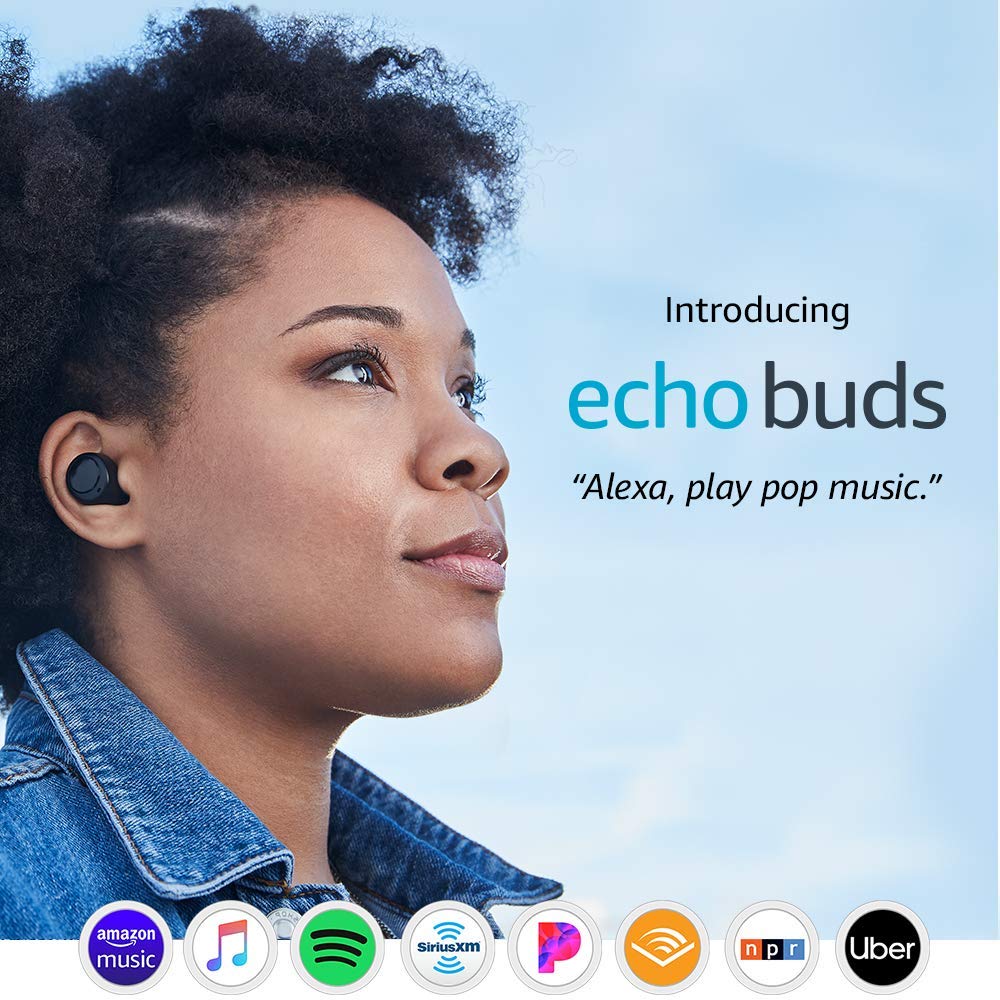
The first of the these new Alexa-powered peripherals is Echo Buds – earbuds that instantly connect you with Alexa (and apparently even Google Voice and Siri).
Yes, this is how Alexa gets in your head – literally. The buds are wireless, of course, with Bose noise reduction technology. (You can tap a bud to cancel the feature when you’re ordering a latte.)
The price? About $130, shipping in time for the holidays, oddly enough.
The second product may have a ring of familiarity to it – Alexa-enabled glasses. Now, if this sounds a little like the ill-fated Google Glass from a few years back, we’re thinking along the same lines.

These Amazon glasses – dubbed Echo Frames – allow you to converse with Alexa without having to take your phone out or look at your wrist. As Wired suggests, this might allow you to interact with Alexa in places that are phone-inappropriate – movie theaters, gyms, or at a restaurant (although that rarely stops people these days).
Unlike Google Glass, you can get a prescription filled with Echo Frames, so you can actually see what’s in front of you while chatting with your favorite voice assistant.
The price? $180 is the number, and Amazon will be beta-ing these eye wearables this fall.
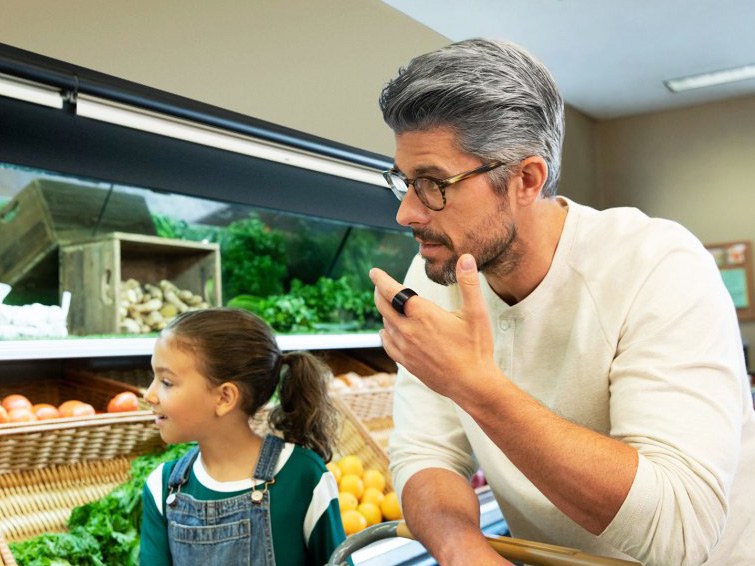
And the other new Amazon gadget that resonated for me – sort of – is Echo Loop. I’ve tested similar products at CES these past few years, where you put a “ring” on your finger, wave it around, and things happen (the TV volume goes up and down, etc.).
Amazon’s ring product is a little different. It has two mics and you speak into it to connect with your bud, Alexa.
That seems a bit odd – speaking to a ring – but then again, Dick Tracey spoke into a watch, and now many of us do every day.
But Amazon isn’t just thinking gadgets with Alexa – they’re focused on personality. The Amazon team also announced last week that Samuel L. Jackson is now the first celebrity replacement voice for Alexa on Echo-embedded devices.
At a cost of just 99¢, the star of many Quentin Tarantino films and endless Capital One commercials  can tell jokes, set timers, and even play music. It turns out there’s a clean and an “explicit” version of Jackson available, depending on your sensibilities and whether there are children or bosses around.
can tell jokes, set timers, and even play music. It turns out there’s a clean and an “explicit” version of Jackson available, depending on your sensibilities and whether there are children or bosses around.
This is apparently the beginning of a personality program for Alexa, as other voices from the worlds of sports, entertainment, and music – like Cardi B and Harrison Ford – will be available in Amazon’s updated version of ring tones for Alexa devices.
Amazon’s rush to “productize” Alexa makes you wonder what other products they’re cooking up that would go well with voice commands.
That might mean connecting Alexa with things we do several times a day – eat. And thus, it’s not surprising there are rumors of food-related applications in the Echo pipeline, designed to combine some of our favorite activities.
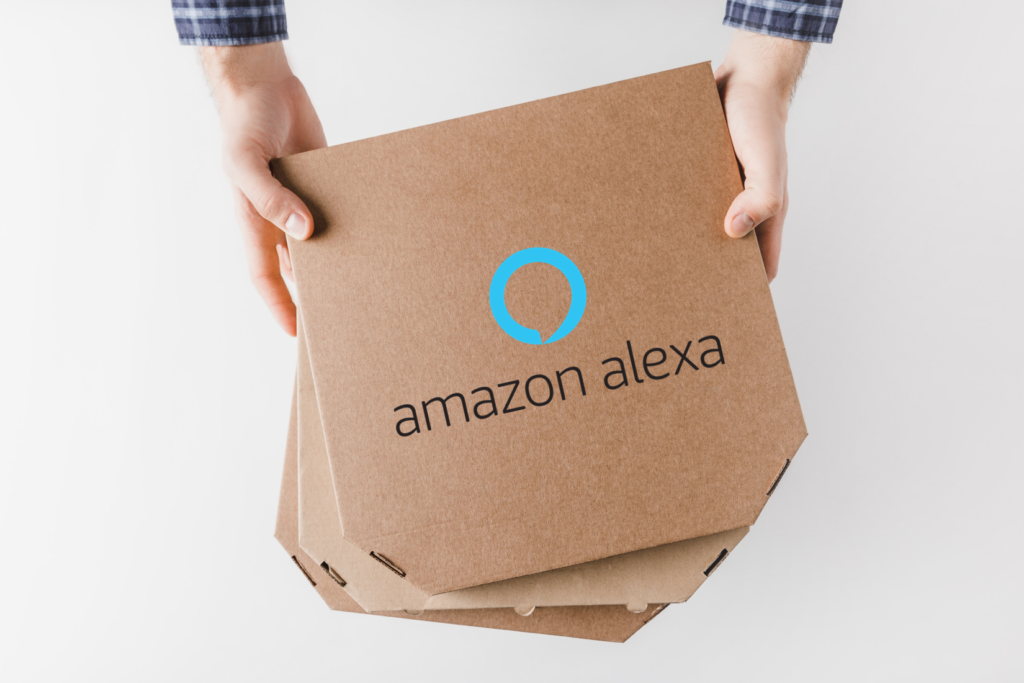 Echo ‘Za is one of these – a clever way of enjoying your favorite music or radio station while you scarf down a pepperoni pizza. You can definitely see a bidding war breaking out between Domino’s, Little Caesars, Pizza Hut, and Papa John’s to see who will nail down the Alexa naming rights.
Echo ‘Za is one of these – a clever way of enjoying your favorite music or radio station while you scarf down a pepperoni pizza. You can definitely see a bidding war breaking out between Domino’s, Little Caesars, Pizza Hut, and Papa John’s to see who will nail down the Alexa naming rights.
But my favorite rumored Alexa beta product is all about how many of us start our days – and no, I’m not talking about turning on a radio station.
Perhaps the most mind-blowing Alexa application is rumored to be embedding its voice technology into coffee cups, items that many people carry around all the time, from Seattle to Sarasota.
I’m thinking Echo Caf could be the next breakout product for Amazon’s growing line of 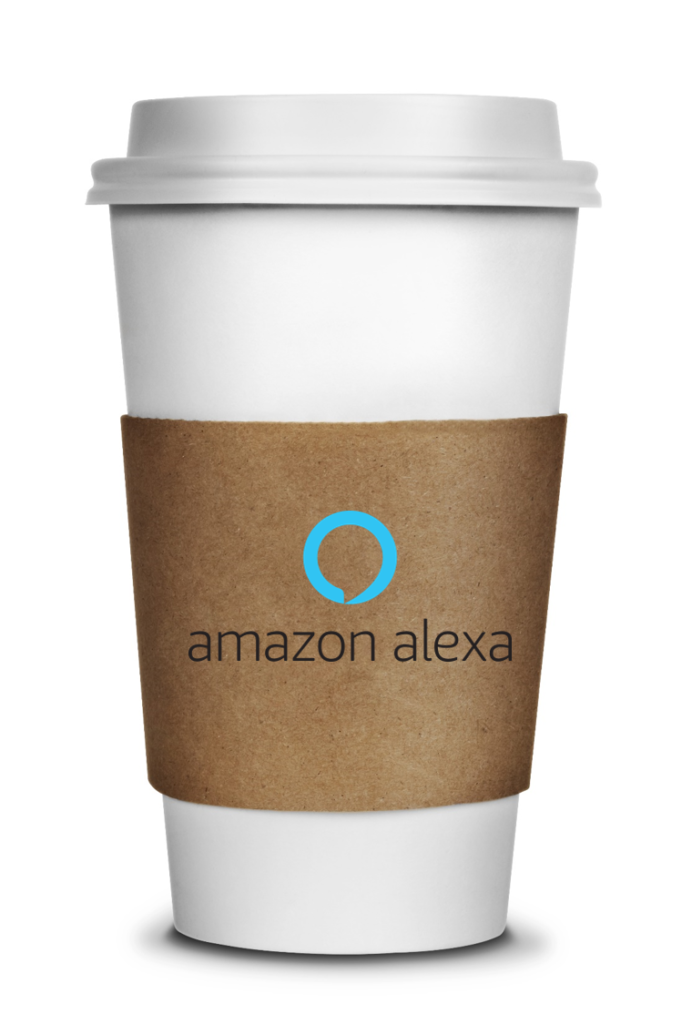 Alexa items, a unique way to combine our addiction to caffeine with our addiction to giving voice command orders to invisible devices and hoping for a positive result.
Alexa items, a unique way to combine our addiction to caffeine with our addiction to giving voice command orders to invisible devices and hoping for a positive result.
Alexa, order me a “Skinny grande frappuccino.”
At CES in January, we’ll be on the lookout for the next line of Amazon Alexxa products, with an eye – and ear – on how Google will respond, hopefully with clever, innovative products of their own. Maybe Amazon’s Echo Frames will signal the resurrection of Google Glass, which would make me happy.
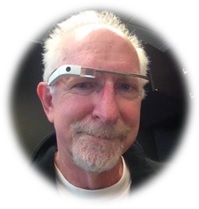 Mine has been gathering dust since I took the plunge back in 2014, spending an obscene amount of money to be one of the first to try on a pair of these techie specs. My Google Glass is still in great shape, hardly used, and well-maintained.
Mine has been gathering dust since I took the plunge back in 2014, spending an obscene amount of money to be one of the first to try on a pair of these techie specs. My Google Glass is still in great shape, hardly used, and well-maintained.
Make me an offer.
We are in the process of doing research on our own research – Techsurvey 2020 – set to launch in January. You can count on new, expanded questions about smart speakers and “voice,” becoming more and more important to the radio industry with each passing year. To reserve your spot in Techsurvey 2020, contact our research guru, Jason Hollins.
And our CES Radio Tours are booking up fast. It looks like we will be taking a record 4 tours of future-thinking broadcasters on guided journeys through the innovation-filled Las Vegas Convention Center. If you’re thinking about joining us this January, contact Paul Jacobs soon.
And if you’re still reading, I made up those last two Alexa products. Who in their right mind would embed a voice assistant in pizza boxes or coffee cups?
- Flush ‘Em Or Fix ‘Em?What Should Radio Do About Its Aging Brands? - April 9, 2025
- Radio: It’s Time To Stop Playing Small Ball - April 8, 2025
- Why AM/FM Radio Will Never Die - April 7, 2025




Fred, excellent article and information as always. Thank you. I too am in the pilot program for the Alexa Auto device. I believe the “invitation only” part is just an effective marketing tactic to generate interest and make folks feel special when they receive the email letting them know they are approved to purchase the auto device. A PD friend suggested I sign up for an invite many months ago.
I would agree with the majority of KUPD’s Larry McFeelie’s review of the device. The cord hanging down from the air vent clip holder is not pretty and there is no good way to hide it. The biggest issue I’ve had so far is the device will say “not connected to the Internet” when my I Phone clearly has a strong signal. So, the interaction between the Alexa Auto device and a cell phone is not always as smooth as it should be. If you read reviews of the device online, that is one of the major complaints. One thing that can help remedy the situation is to go to your Alexa app and make sure “use cellular data” is turned on. I have to believe Amazon will soon send out some “fixes” for the first run of the auto device.
Regarding the functionality of the device vs. my I Phone, I do enjoy being able to ask the device to play any radio station I ask for by voice command. Yes, you could just open the station app on your phone but the voice command function, as you point out in your article, is very convenient. I enjoy being able to ask Alexa for today’s news and the device immediately pulls up NPR news, then Reuters etc. and you can customize what you want in the Alexa App. You can ask the device to play 70’s Rock or 80’s Pop for example, and the device will stream the music commercial free without having to have a subscription as you must have to get Siri to stream music on an I Phone. That is a challenge for radio and reason for PD’s to have more balanced and perfectly scheduled music logs than ever before as well as having remarkable talent and content on their brands.
As I continue to hear various messages on radio stations across the country demonstrating to listeners how to get smart speakers to play their radio stations, I noticed just how clean NPR news referred to smart speakers at the end of their newscast. They had a short Target Store Home Products Ad (a designed Public Radio Ad) and instead of the news anchor using the words “smart speaker”, she said, “just ask your device to play Target stories”. With all of the different devices out there, it was a simple and clean way to get the message across. I made a note for PD’s after hearing that reference.
Mike, this is a great comment and I appreciate your perspective on note just the device, but its impact on radio. And you are correct about NPR. They’ve been thinking hard about this platform since the day it came out. Their language and positioning is excellent, along with their simple “how to” videos that show you exactly how to access them/their member stations as seamlessly as possible. Thanks again.
I was just thinking about Google Glass earlier this week. I’d buy them from you…but they just don’t fit my face frame. 😉
Thanks so much for all of your great information. I have mentioned your articles to someone every week, and I’m grateful for the time, energy, and effort you put into your thoughtful blog posts.
Much appreciated, Amy. And if you change your mind on Google Glass, don’t hesitate to get back in touch!
I can just hear your prophetic words being added to the list of great, forward-thinking predictions of the past:
“This ‘telephone’ has too many shortcomings to be seriously considered as a means of communication. The device is inherently of no value to us.” –Western Union internal memo, 1876
“We don’t like their sound, and guitar music is on the way out.” –Decca Recording Co. rejecting the Beatles, 1962
“No one will need more than 637 kb of memory for a personal computer. 640K ought to be enough for anybody.” — Bill Gates, founder of Microsoft, 1981
“Who in their right mind would embed a voice assistant in pizza boxes or coffee cups?” — Fred Jacobs, 2019
Don’t bet on it. That said, stranger things have happened. Thanks for the support, Dave!
I’m not sure why any would consider this device an option for their car. If you have a Alexa speaker at home, you have the app on your smartphone that you used to set it up. That app does the same thing a speaker does. Listeners can use a radio station’s invocation on the app and stream a station without all the wires.
Maybe you should drop Amazon a note. 🙂 Thanks for the comment, Chris.